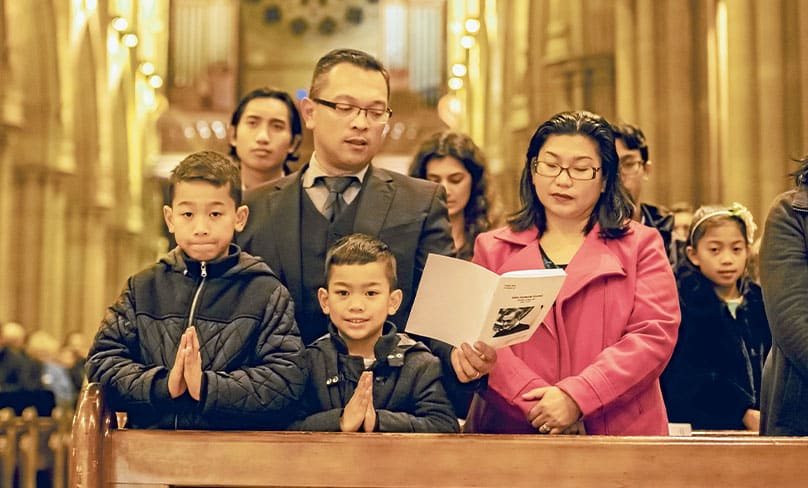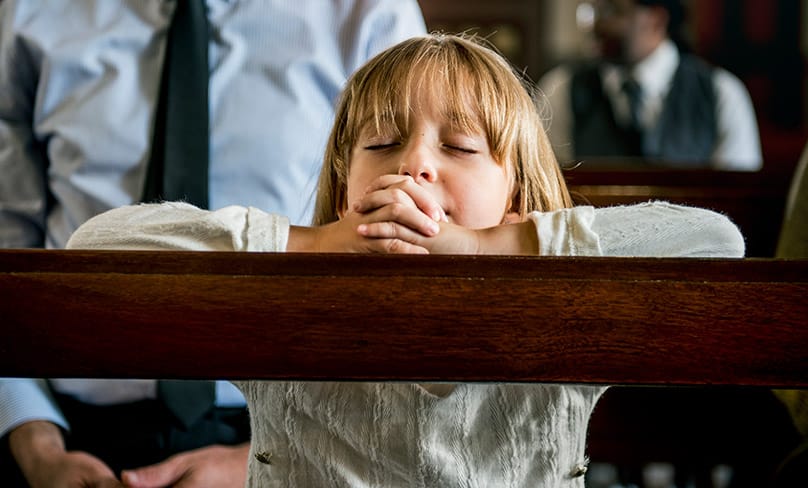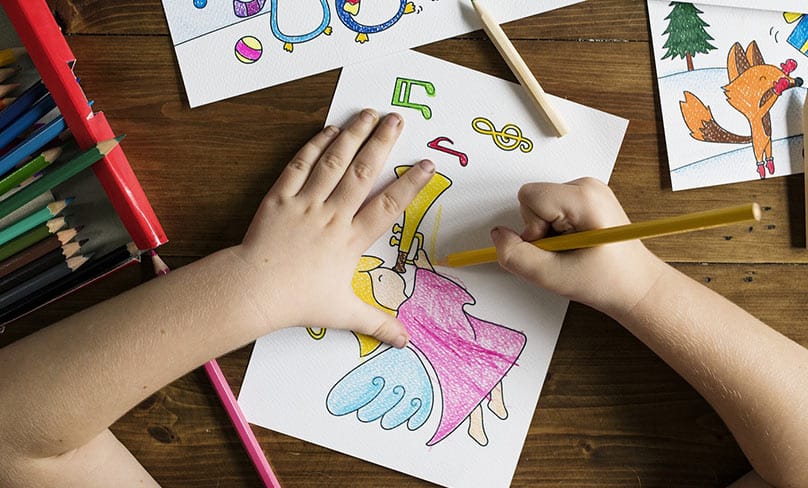
What if our children don’t want to go to Mass? Should we insist? Isn’t there a danger that forcing the issue will make them bitter and resentful, and even more likely to abandon the Church once they’re on their own?
Yes, there is a danger. But as sensible parents know, raising children is often the practice of navigating a narrow path between dangers, and rarely a matter of choosing some guaranteed success. Kids have free will, and the best we can do is influence and inform them so they use their free will well.
When our kids go to Mass, they are physically in the presence of Christ. Even if they refuse to receive the sacraments or participate in the liturgy, they are there, and being there is different from being anywhere else in the world.
It’s possible to ignore Jesus and to put up barriers; but it’s also possible that the Holy Spirit will quietly work on our children’s hearts, laying foundations for a strong adult faith.
When our kids go to Mass, they hear the word of God and prayers praising Him. Those precious phrases expressing the foundations of our faith are repeated week after week, and they will stay with our kids forever.
Words are powerful things, and the right words should be seeded deep in our children’s memories. They may blossom unexpectedly when they desperately need them, but only if they’ve been planted beforehand.
When our kids go to Mass, they will see that the Communion of Saints is made up of real people, old, young, rich, poor, healthy, disabled, good, bad, bored, engaged, sincere, hypocritical, but all united in the same act of worshipping God. Religion isn’t for a certain type of person; it’s for literally all of mankind. It’s invaluable to see that reality played out in person every week.
It’s a bad idea to be angry or punitive about Mass attendance. But it’s a good idea to make it commonplace, just part of the family culture.
If children expect to sleep in beds we provide and to eat meals we prepare, they should expect to attend the Mass that gives our life meaning.
So we should be sure to model that ourselves, and treat the Mass as something precious and fundamental.
We cannot force our children to have a relationship with God. God Himself never forces anyone to do anything; he merely invites. It is our job, as parents, to make sure our children are present for that invitation.

TIPS FOR PARENTS BRINGING CHILDREN TO MASS
by Theresa Chahine Ed and Mons Shora Maree
Jesus said, “Let the little children come to me, do not stop them, for the kingdom of God belongs to such as these.” Mk 10:13-14
As parents we are called to ensure that our children come to Mass every Sunday and educate them in participating in the main divine worship event of the Church’s week and help them celebrate and learn about their faith.
From the Gospel, we see that Jesus called the children and rebuked those who stopped them from approaching him. Parents should never be afraid to attend the Divine Liturgy (Mass) for fear of their children being too loud or disruptive. Here are some tips:
Tip 1. BE CONSISTENT! Every Sunday – Both Parents – (Pilot and Co Pilot!)
Mass needs to be a consistent part of children’s lives every Sunday. The sooner they attend after they are born, (and even while in the womb,) the more familiar they become and the easier it is. Again, it is never too late to start, and it is important not to stop because they “play up”. It requires the presence of BOTH PARENTS with patience and perseverance week after week, and it will get better.
Tip 2. BE POSITIVE about faith in God, Mass, Prayer & Church.
Always be positive about your faith, the Church, your parish and Mass in front of your children especially during the week at home. If you are negative this can affect their faith and they can become reluctant to attend. The more positive and active you are, the more positive they will be and the more likely they will attend later in life.
Tip 3. Your Parish – OUR SECOND HOME AND FAMILY.
The parish needs to be a spiritual home for you and your children. Don’t just come on Sunday like a stranger. Get involved with your children. Come to the other spiritual and social events as well as Sunday Mass.
Make an effort to get to know other families with children who are the same age. Attend the regular brunches.
Take them to meet the Priest outside after Liturgy. If the parish is home, they will always want to come. More importantly they will know that it is there in times of need as they grow up.
Tip 4. AT HOME BEFORE DEPARTURE.
a.) Make sure children have something to eat before leaving home so they will have energy to be more focused during the Liturgy. Have children visit the bathroom right before walking out the door of your home or into the church.
b.) Dress children in special clothing that they wear only for church or other special events. This does not mean the clothes have to be expensive or extravagant, but if they are dressed in something special, they will begin to understand that they are going somewhere special.
Tip 5. THEIR ‘CARRY – ON’ ITEMS for Mass.
Depending on age, toys are usually not appropriate for children at Liturgy. For very young children, if you are going to bring a small book or toy with you, try and make it a Bible in picture or on the Mass so they know this is “Jesus” time. Any toys or books should be quiet and made of soft material so that they do not distract those around you from their prayer especially if they are dropped.

Tip 6. ON THE WAY in the Car.
Prepare children for the Divine Liturgy. Get children in the “zone” for Liturgy while driving to Church. Say a prayer, a decade of the rosary, or play religious music on the way to Church. In the week leading up to Sunday, talk about what season the Church is in. Talk to them about the symbolism of the Liturgy and the colour of the priest’s vestments. Jesus has a special message for us to help us. You might read the Gospel at dinner during the week or in the car on the way to Church. Tell them you will have a pop quiz about the Gospel or homily after Mass on the way home. The more they understand about the Liturgy, the more engaged they will be.
Tip 7. ON ‘ARRIVAL’ at Church
Set expectations. Before going into the church take a moment to remind children what you are about to do. Talk to them about your expectations of how they should behave. Make sure they know what their job is at Liturgy. You might say that their job is to be quiet and to participate by sharing their voices and praying. Tell them that they also need to be mindful to help others around them to pray.
Tip 8. SEAT ALLOCATION … Gold Class/Row A/VMAX – Free!
That means let them sit at the front. Yes, even in the first row. That’s the equivalent to Vmax, they will have the best view of all the action of the Liturgy, around the altar, the priest, the servers, the processions, the incense, the prayers hymns and responses. Initially it may be difficult, but it allows children to see 3D what is happening and not be only seeing a lot of people’s backs in front of them.
Tip 9. WHEN THERE IS ‘TURBULENCE’ and alarms sound.
If your child makes an occasional noise, try not to feel self-conscious. Most people understand and have been through it themselves. It is not a good idea to leave every time your child makes a bit of noise as it may encourage the child to start to do it, so you leave.
However, if it is continual and disruptive noise or a tantrum it is a good idea for one parent to quietly leave to the back of the Church or just outside, but to return immediately once the child calms down.
Try to avoid giving the understanding that they are going outside to play. Parents should alternate each Sunday between who takes care of the turbulence and go out with the child and who will stay with other children so that one parent is not missing their own nourishment every week.
Tip 10. CONNECT THEM TO THE ACTION.
Make sure you are leading your children by example responding and participating in the Liturgy yourself. Modelling is very important. Encourage them to join the choir, altar serve, read the prayers of intercession, share the peace or bring the gifts to the altar. Make sure you are focused on the altar and engaging in the Liturgy. You can whisper to them about the Mass parts coming up and encourage them to say Amen and other responses with you.
Tip 11 FOLLOW UP AFTER MASS – Give Positive Feedback
After Liturgy praise your children for their good behaviour. If they were disruptive, tell them what they need to improve for next time and remind them before Liturgy next time. Have a pop quiz and answer questions the children have about Liturgy and talk about the homily they have heard.
